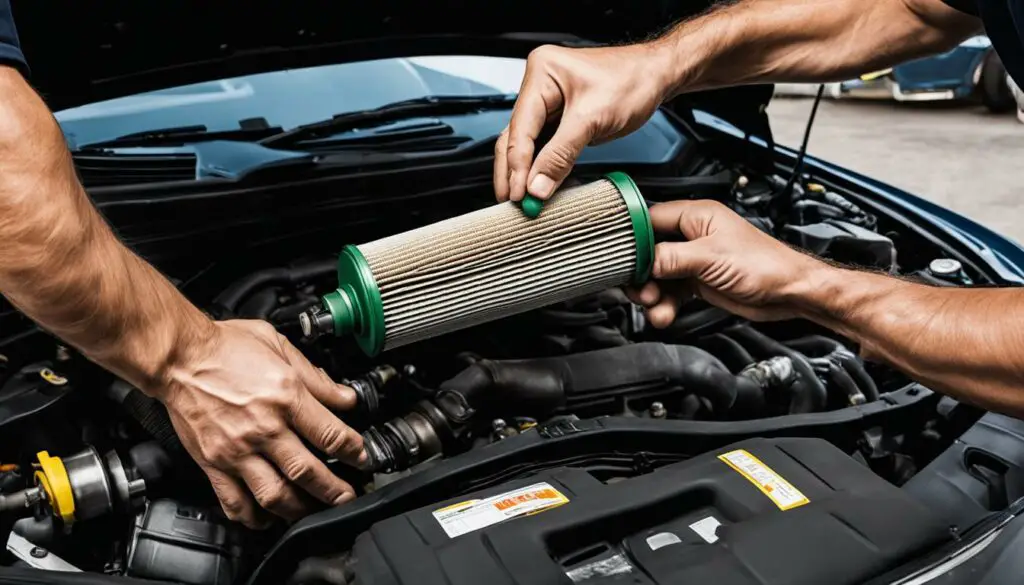If you’re looking for an environmentally friendly option for your oil filter needs, Ecogard oil filters might be just what you’re looking for. These filters are a type of “cartridge” or “canister” oil filters that are made of pleated, paper filter media and plastic. What sets them apart is their eco-friendly nature. Unlike traditional oil filters, Ecogard filters can be incinerated after use, reducing the impact on landfills.
ECOGARD is the brand that pioneered the manufacturing and distribution of eco oil filters in the aftermarket. While they may not be the industry standard yet, more and more vehicle manufacturers are recognizing the importance of reducing environmental impact and adopting eco oil filters in their engine designs.
Key Takeaways:
- Ecogard oil filters are environmentally friendly and can be incinerated after use.
- ECOGARD is the brand that leads in the manufacturing and distribution of eco oil filters in the aftermarket.
- Vehicle manufacturers are increasingly adopting eco oil filters to reduce environmental impact.
- Proper installation practices are crucial to avoid engine damage.
- Eco oil filters are part of the future of vehicle maintenance as more vehicles become eco-friendly.
The History of Eco Oil Filters
Eco oil filters have been in use since the 1980s, primarily in European vehicles. These filters gained recognition for their environmentally friendly design and the potential to reduce waste in landfills. ECOGARD, a leading brand in aftermarket manufacturing, recognized the importance of eco oil filters in the market and began manufacturing and distributing them to meet the growing demand.
The name “ECOGARD” itself stands for “eco oil filter,” highlighting the brand’s commitment to developing environmentally friendly filters. While the cost of manufacturing and slow OEM engine design adoption have initially limited their widespread use, the rising demand for more eco-friendly vehicles is driving the industry toward incorporating eco oil filters in engine designs.
Benefits of Eco Oil Filters
- Reduced impact on landfills: Eco oil filters made of pleated, paper filter media and plastic can be incinerated after use, reducing waste accumulation in landfills.
- Environmental sustainability: By using eco oil filters, vehicle owners contribute to reducing their carbon footprint and promoting a greener future.
- Improved filtration: These filters effectively trap contaminants, ensuring clean oil circulates through the engine and prolonging its lifespan.
Despite the challenges they face, eco oil filters are becoming increasingly popular due to their positive impact on the environment. The next section will provide valuable information for installers who work with these filters, ensuring proper installation practices and optimal performance.
What Installers Need to Know
Installing eco oil filters requires specific tools and training to ensure proper installation and functionality. Use the following guidelines and practices to ensure a successful installation:
- Apply a liberal coating of fresh oil: Before installing the eco oil filter, apply a generous amount of fresh oil to the o-ring. This helps create a proper seal and prevents leaks.
- Install the o-ring correctly: Make sure to install the o-ring in the correct groove specified by the manufacturer. This ensures a secure fit and prevents any oil leakage during engine operation.
- Tighten the cap to recommended specifications: Use the appropriate tools to tighten the cap of the eco oil filter to the recommended specifications provided by the manufacturer. This ensures a proper seal and prevents any oil leaks.
- Conduct a pressure test: After installing the eco oil filter, start the engine and carefully inspect for any signs of leaks. Conduct a pressure test to ensure that the filter is properly sealed and functioning effectively.
Proper installation practices are essential for the effectiveness and longevity of eco oil filters. Following these guidelines will help avoid installation mistakes that can lead to oil leaks and potential engine damage.

The Future of Eco Oil Filters
With over 263 million passenger vehicles and light trucks on the road, the need for eco-friendly solutions to reduce environmental impact is crucial. The implementation of eco oil filters can play a significant role in achieving this goal.
Currently, only about 20% of vehicles are equipped with eco oil filters, highlighting the untapped potential of this technology. As more vehicles transition to being eco-friendly, it is essential for businesses to adapt and include eco oil filters in their inventory.
ECOGARD, a leading manufacturer and distributor of eco oil filters, is ready for this change. They have been at the forefront of providing eco-friendly solutions in the aftermarket. ECOGARD ensures that eco oil filters are readily available for vehicles that already use this type of filter, making it easier for businesses to incorporate them into their maintenance practices.
However, transitioning the entire industry to implement eco oil filters in their engine designs will take time. Original Equipment Manufacturers (OEM) manufacturers need to embrace this change and make eco oil filters a standard feature in their vehicles.
As the vehicle population continues to grow, the demand for eco-friendly vehicles and eco oil filters will increase. ECOGARD’s readiness for change gives businesses the opportunity to champion eco-friendly practices and cater to the evolving needs of consumers.

By offering eco oil filters, businesses can contribute to reducing pollution and minimizing their environmental impact. As the industry progresses towards a greener future, incorporating eco oil filters in inventory is not just a choice, but a responsibility.
Conclusion
Ecogard oil filters offer an eco-friendly solution for vehicle maintenance. These filters, made of pleated, paper filter media and plastic, can be incinerated after use, reducing waste in landfills. While they may not be the industry standard yet, the increasing demand for more eco-friendly vehicles is driving the adoption of eco oil filters.
Installers play a vital role in ensuring the effectiveness of eco oil filters. Following proper installation practices is crucial to avoid engine damage. Applying a liberal coating of fresh oil to the o-ring, installing it in the correct groove, and tightening the cap to the recommended specifications are essential steps in the installation process.
As the automotive industry transitions towards more eco-friendly vehicles, it is advisable for installers to include eco oil filters in their inventory. You can find Ecogard oil filters through their network of authorized distributors. These distributors ensure accessibility and availability, making it convenient for installers to obtain high-quality eco oil filters for their customers.
FAQ
Who manufactures Ecogard oil filters?
Ecogard oil filters are manufactured by ECOGARD, a leading brand in producing environmentally friendly oil filters.
What makes Ecogard oil filters unique?
Ecogard oil filters are made of pleated, paper filter media and plastic, which can be incinerated after use, reducing waste in landfills. They are designed to be eco-friendly while effectively filtering oil.
Are Ecogard oil filters the industry standard?
While Ecogard oil filters are not yet the industry standard, more vehicle manufacturers are adopting eco oil filters to reduce environmental impact and meet the growing demand for eco-friendly vehicles.
How should eco oil filters be installed?
Proper installation practices for eco oil filters include applying a liberal coating of fresh oil to the o-ring, ensuring it is installed in the correct groove specified by the manufacturer, tightening the cap to recommended specifications, and conducting a pressure test with the engine running to check for leaks.
Why is proper installation important for eco oil filters?
Proper installation practices are crucial to avoid engine damage and ensure the effectiveness and longevity of eco oil filters. Many installation mistakes occur during the o-ring installation, which can lead to oil leaks and potential engine problems.
How widespread is the use of eco oil filters?
Currently, only about 20% of vehicles use eco oil filters. However, as the demand for eco-friendly vehicles continues to grow, it is recommended to include more eco oil filters in inventory to meet the industry’s shift towards environmental sustainability.
Where can I find Ecogard oil filters?
Ecogard oil filters can be found through their network of distributors, ensuring easy access to these environmentally friendly oil filters for vehicle maintenance needs.
